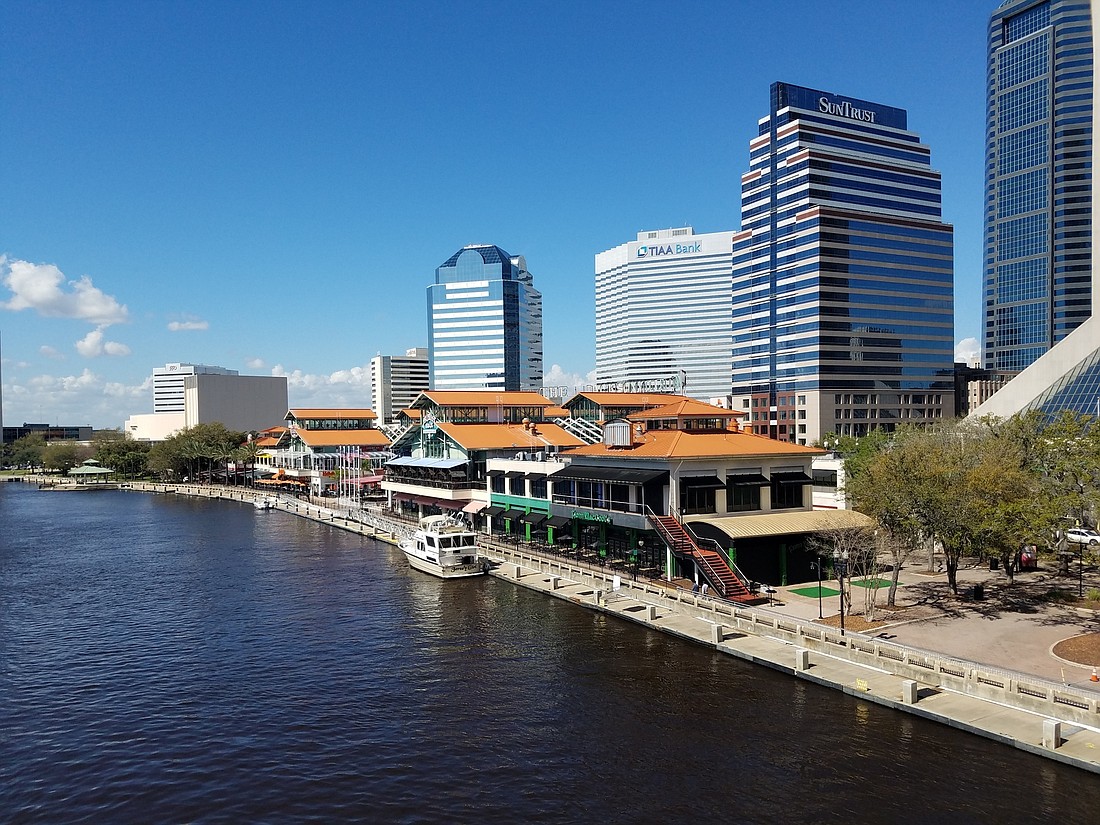
Jacksonville City Council members approved legislation Tuesday night giving the city full possession of The Jacksonville Landing, ending a two-year legal fight over the future of the Downtown riverfront marketplace and setting it up for potential demolition.
Council members voted 15-1 to approve Ordinance 2019-134, a measure that includes a $15 million buyout of Jacksonville Landing Investments LLC’s long-term lease, an additional $1.5 million to help relocate tenants and $1.5 million to demolish the 32-year-old shopping center.
Anna Lopez Brosche was the only no vote. Council members Garrett Dennis, Sam Newby and Matt Schellenberg were not present.
The Landing was built in 1987 at 2 Independent Drive W. on the Downtown Northbank.
According to the legislation, the city is using $14.5 million in debt for the buyout. An amendment added during committee hearings last week moved $3.5 million from the city’s Downtown Economic Development Fund to reduce the debt obligation.
While Mayor Lenny Curry secured enough votes to pass the legislation, the process and the uncertainty of the Landing’s future were criticized.
Council member Danny Becton offered substitute legislation that would remove money for demolition and tenant relocation costs.
Becton said it seemed like the city was “unnecessarily eliminating an entertainment venue” without a plan.
That substitute failed to gain traction with other council members, except for Joyce Morgan.
Others were quick to praise Curry’s proposal.
Bill Gulliford said demolition would benefit potential developers who would have a clean slate to create something new.
“I’m just tickled to death to see movement on the Landing,” Gulliford said. “I don’t have any heartburn about demolishing the structures.”
Lori Boyer said it was time to “move forward with Jacksonville’s future.”
She called JLI partner Toney Sleiman, president of shopping center developer Sleiman Enterprises, one of Jacksonville’s most successful retail operators and asked if he couldn’t make the Landing work, how could the city do so.
Council President Aaron Bowman echoed other claims that the city would end up wasting money on maintenance and repairs if the structures remain.
Bowman said in his role as a senior vice president of JAXUSA Partnership, the economic development arm of JAX Chamber, he often tells people not to visit the Landing.
“Not only is it in a bad state of repair, it’s not an asset for our visitors,” Bowman said.
After the vote, Curry’s chief of staff, Brian Hughes, said the support from most council members shows that people are ready for a change.
He said the legislation not only settles an ongoing lawsuit, it treats the city and Sleiman’s company fairly.
“It’s good for the taxpayers in the long run and it gets us moving on what comes next,” Hughes said.
The city enters a 45 day due diligence period to evaluate the buildings and negotiate buyouts with the Landing tenants.
Hughes reaffirmed the administration’s stance that it is open to development ideas but that any proposal would include public green space.
“First and foremost, we have to have conversations with the current tenants,” Hughes said.
He said the administration and the Downtown Investment Authority, which oversees Downtown development, wants to keep as many of those restaurants and retailers Downtown as possible.
When Rouse-Jacksonville Inc. developed and opened the Landing in 1987 as a mixed-use mall, it featured high-end retailers and restaurants.
Since then, tenants closed or relocated to other shopping centers.
Rouse owned the three buildings that comprise the mall and leased the ground underneath from the city.
The company sold the mall to Sleiman Enterprises Inc. through the JLI subsidiary in 2003 for $5.3 million. JLI assumed and extended the lease agreement with the city through 2056.
Toney Sleiman announced redevelopment plans soon after purchasing the mall.
For the past 16 years, Sleiman and the city struggled to agree on redevelopment efforts, including a plan under Mayor Alvin Brown’s watch that would have included $12 million in city-backed incentives.
The dispute took a sharp turn after Curry took office in July 2015.
In October 2015, the city sued JLI for failing to complete a purchase-and-sale agreement for what is called the “east parcel,” comprising a parking lot next to The Jacksonville Landing.
While JLI paid the city $4.35 million for the 1.6-acre site, the city claimed the company did not complete all aspects of the sale. JLI accused the city of not delivering a deed for the property.
That dispute continues in the 4th Judicial Circuit Court. A two-day nonjury trial is scheduled to start July 29.
In November 2017, JLI sued the city for failing to maintain the surrounding property and bulkheads along the St. Johns River – an issue JLI claimed was a factor in the mall’s continued decline. Soon after, the city initiated eviction procedures based on a similar claim that JLI wasn’t maintaining the mall.
The sides came to an agreement in February.
Through a joint statement, Sleiman and Curry said they worked out a deal “by which The Jacksonville Landing and the property at its location would see their best and highest use realized.”
“Both parties agree that with the future of Jacksonville shining so bright, now is the time to forge this path forward,” the statement continued.
In the next six months, Hughes said to expect the DIA and the administration to aggressively seek proposals for redevelopment.
He said that while the administration favors demolition, there will be time to discuss all possibilities.
“We’re not going to say never,” said Hughes about using the buildings for another purpose.
“If somebody comes to us with an amazing plan that makes sense given the expertise at DIA and throughout the city, we’ll listen,” he said.